Note: I tried to create the most complete article on the web about procrastination. I’m not sure if I succeeded, but it ended up being 10,000-word long. As it may be really challenging to read(or scroll down) to each section, you can use the menu below to jump to the topics that you are really interested in. Happy reading!
- UNDERSTANDING PROCRASTINATION
- 33 REASONS WHY YOU PROCRASTINATE
- TYPES OF PROCRASTINATORS
- TOP 10 LIES PROCRASTINATORS TELL THEMSELVES
- HOW TO STOP PROCRASTINATING
- BONUS 1 – A FEW STUDIES ON PROCRASTINATION
- BONUS 2 – PRACTICE
The funny thing about this article is that I wasn’t actually planning on writing it. In fact, I started doing some research for myself, regarding solutions against procrastination, as I’m battling this issue just like everyone else. While reading, I realized that there is a lot of information on the web about this topic, but no complete guide to gather all this knowledge into one place. Thus, I ended up writing on this article for about three-four weeks and making it the biggest piece of content I’ve ever created. On top of that, reading and applying all the advice I found on the web really helped me understand procrastination better and deal with it easier.
UNDERSTANDING PROCRASTINATION

In order to better understand what procrastination is, you first have to get a grasp of what it’s not:
- Procrastination isn’t a time-management issue
- Procrastination isn’t laziness
- Procrastination isn’t a matter of planning
Truth be told, in recent years, experts have given much more attention to this issue, which studies have released to be “a complicated failure of self-regulation”. “Emotional regulation, to me, is the real story around procrastination, because to the extent that I can deal with my emotions, I can stay on task”, says Timothy Pychyl, Ph.D, associate professor of psychology at Carleton University in Ottawa.
The real definition of procrastination, as defined by experts is “the act of putting off or delaying an action to a later time”. Now, this sounds a little bit like you, doesn’t it? But does this also mean that you’re a procrastinator? The reality is that we all procrastinate to some extent, no matter if we’re talking about a mere employee or a multimillionaire. The real issue appears when procrastination starts to impede on normal human function, as some doctors see this as the basis of a psychological disorder, similar to drug or alcohol addiction. This happens when usual procrastination enters a chronic state, which around 20% of the people stated to be suffering of. So, are you a chronic procrastinator or not? Is there something you need to worry about?
Let’s find out by taking a look at various definitions:
Definition #1 – Procrastination is the voluntary act of postponing an important task, although we know that the outcome will make us suffer.
Definition #2 – Recent neuropsychological research shows procrastination as a problem in the frontal systems of the brain which are known to be in control of self-regulation. Behaviors like self-control, planning or problem-solving are in the same “executive functioning” category, which is now thought to be connected to procrastination.
Definition #3 – Psychologically speaking, procrastination goes hand in hand with other personality issues such as low self-esteem, limited beliefs or anxiety disorder.
Definition #4 – Another thing that defines procrastinators is that they are more conscious than normal people and they prefer imagining themselves obtaining perfect results, than actually doing it.
Definition #5 – Procrastination is based on the avoidance of anxiety. The source of this anxiety may differ from one procrastinator to another, as one may be afraid of assuming too much responsibility, while the other may not wish to stress about small things that could impede on daily comfort.
Procrastinators are also thought to care more about their present selves and look for immediate rewards, while normal people usually make plans for their future selves. For example, you got started on a new project and envision how your life will be when this project succeeds. You make lists, write your ideas down on some pieces of paper but, when the time for real action comes, you prefer instant gratification like watching your favorite TV show or playing a game.
Before I end this section, I feel that it is important for me to point out a few more things:
-
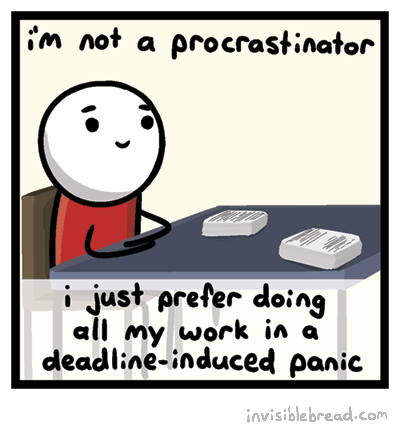
Source: invisiblebread.com You are not born a procrastinator, you become one. Self-regulation problems are usually the effects of being raised by strict parents. In this case, procrastination is thought to be a form of rebellion. Still, this doesn’t mean that you should blame your parents for your current actions!
- Procrastinators are always looking for distractions and can’t keep focused on a task for a longer period of time.
- As it is a self-regulatory issue, procrastinators tend to consume more alcohol than normal people.
You may not see procrastination as a real issue. Maybe you like your current lifestyle and the comfort it gives you. But, as a matter a fact, studies have shown that procrastinators are more prone to health problems than non-procrastinators. Insomnia, a compromised immune system or gastro-intestinal problems are just a few. On top of that, procrastination can ruin your relationships and heavily affect your day to day life.
If you’re still having problems figuring out if you’re a procrastinator or not, I invite you to scroll down to the tests at the end of this article and find out where you fit. However, if you’ve decided that you do procrastinate and are motivated to change this behavior for good, then read below the 33 reasons for which you may be procrastinating.
33 REASONS WHY YOU PROCRASTINATE
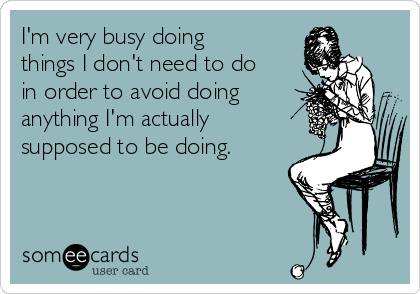
One of the things that surprised me when doing the research for this topic is the diverse number of reasons for which we procrastinate. I’ve found at least 30 reasons for which we postpone things, which could come into effect depending on the situation. This just adds up to the complexity of this issue and makes procrastination even harder to beat. While thinking back to various projects I quit in the past because I was a procrastinator, I checked at least 10-15 reasons from the list below. Let’s see how many you will! Are you a bigger procrastinator than I was?
[optinform]
- You don’t know where to start
Starting a new project is usually great! The enthusiasm just pushes you forward, and you feel like a God between mortals. No mountain is too big for you. Or, this is at least how you imagine things to be. Because when the time comes to actually get started on that thing, you realize that you don’t know where to begin exactly, and become overwhelmed by the complexity of the things you have to do. So, you postpone it for later when you will find yourself confronting the same situation.
Pro tip: A big project will look much easier to complete once you have a detailed plan of action, listing each step and sub-step.
- You wait for the right moment
The right moment is right now! But you already know that, don’t you? So, why wait?
I actually found myself in this situation many times:
“I don’t have enough money!”
“I’m not popular enough.”
“I don’t have enough knowledge.”
The reality is that you can always lay a brick to your dream or project, no matter how small. It’s always the right time, but not always the right attitude!
- You’re a perfectionist
I would single out this reason to be the most popular that I found on the web.
Perfectionism is somehow connected to “the right time”. You want to do things perfectly and you are putting them off until you have the right means to do this. As perfection is not possible, you will never have the right means to go for whatever you desire. There will always be “bugs” in life, dreams or plans as there are in software and apps. But they still work, don’t they?
iPhone’s first presentation was made by using three different phones, as just different bits of the software worked on each of the three. Today, iPhone is probably the number one most sold product on the planet.
- You fear that you might fail
I feared failure for a big part of my life, until I truly asked myself the question: “what’s the worst thing that can happen?” – will I lose an arm, a leg, a friend? Usually, the worst thing that you can think of is miles away from the real outcome.
When talking about procrastination, the fear of failure keeps you from doing things, as you can’t really fail at something you don’t actually do. It’s easier not to try at all than to try and be unsuccessful.
- You don’t feel like doing it
We’ve all had to face unpleasant tasks in our lives and they are probably the most common reason for which we procrastinate as a whole. There’s no joy in taking out the garbage, for example, or cleaning the garage. Motivation is not necessarily an issue when it comes to this but, when faced with this source of procrastination, you should still ask yourself if your attitude is the one stopping you or if it’s just a task that 90% of the population would consider boring. You can do some thought tracking to identify if this happens too often or not.
- You don’t know how
It’s hard to get started on something you don’t know how to do. But not getting started at all will not bring you any progress. So, doing nothing about it will just keep you stuck in the same “I don’t know how” loop and you’ll always hit the same dead end.
The answer is simple. Just learn how to do it! When I don’t have enough knowledge about something I start self-educating myself about it. I love learning new stuff. Don’t you?
- You find the task boring
Some tasks are just more boring than others. That’s the truth. But what I found out is that they don’t usually go away, and you will still have to finish them eventually. Once you make a habit out of it, you will see that it’s much easier to take on boring tasks first and leave the goodies for last.
- You fear success
Yes, that’s right! It’s hard to believe, but some people fear success. And this fear opens the door to procrastination. Why? Because, if you succeed, people will have higher expectations of you. This comes up as a constant pressure. Procrastination is, in this case, a method which you use to cope with all the stress.
If you don’t try, than you don’t succeed, thus, the pressure will be lower.
- You’re a rebel
Studies show that this may be one of the top reasons for which people procrastinate. Delaying to do something may show a form of rebellion against anything imposed, such as tasks, schedules or standards.
10. You want to be in control
When you procrastinate you feel like you’re in control of the task. You can start working on it whenever you please (usually never or as late as possible). The thing is that, when you start the actual task, you feel like losing all the control you had, and, as a consequence, you procrastinate even more.
- You don’t think you can do it
Believe it or not, low self-esteem is actually directly tied in with procrastination. As I was saying earlier, it relates to anxiety and the feeling you may have that you don’t have what it takes to complete your task. Consequently, you don’t even try, because you’re afraid. This is something that I’ve struggled with in the past and something I still struggle with, sometimes.
Look, fear can be paralyzing, and when you look at a project that seems very complex or difficult, anxiety can take over and before you know it, you’re hyperventilating every time you even think about starting work on it. That can make it really hard not only to get any work done, but even to attempt to start.
- You have no motivation

Lack of motivation plays a huge part in procrastination. Why? Because it’s hard enough to do stuff we actually want to do, but things we don’t particularly enjoy? Forget it. Why do you think it’s so hard to get kids to do their chores and other related tasks? Because they have zero motivation for it. They do not yet understand that having a clean environment should be the only motivation they need, so they procrastinate. That’s why we bribe them.
Much like a little kid, you don’t want to start work, because you don’t particularly want to. If the answer to the question “And what do I get if I do this?” is not exciting, then you won’t feel compelled to do it. There is no emotional reward. It really is as simple as that. I have a trick for that, but I’ll discuss it in the next section.
- It’s not relevant anymore
There are certain tasks we feel obligated to do, but don’t really want to, so we procrastinate. Whether it’s restoring that old table your grandma left you, taking up painting, or running a 10K, there are old dreams or goals that no longer fit in our lives anymore. If that’s the case, don’t feel like you have to do them regardless, because you’ll never get around to it, trust me.
- You over-analyze the situation
Something I suffer from is over-analyzing every possible situation, scenario, and yes, project that I need to work on. Can you guess what happens? Yep, I procrastinate on starting to actually work on it, because I’m too busy thinking about the problem and its every possible aspect. Don’t be like me.
- You engage in self-sabotage
Then, there’s the circumstance in which you actually sabotage yourself, whether you do it consciously or not. If you start working and take active steps towards finishing you’re job, it’s going to get done, but deep down, that’s not really something you want. Why? Because you don’t feel like you deserve it or you’re worthy. So what do you do? You create problems for yourself and delay the process as much as possible. Be careful with this one, because you may not even realize you’re doing it.
- You lack focus and get distracted
I think we can all relate to this one – focus is hard to attain and giving your full attention to something is certainly difficult for the best of us. Distractions are literally all around us and more often than not, right in front of us. Be honest, what is eating up most of your time, when you procrastinate? Raise your hand if the answer is “the internet”, because I know that’s where my time is going.
Look, YouTube, email, Facebook, and reddit might as well be black holes because they eat up all your time and attention. I know how hard it is to ignore the cat videos, the memes, the news, and the messages, but if you’re ever going to get any work done, you have to draw the line somewhere. Internet, pets, or family – I don’t care. They are sources of distraction and before you know it, you’ve lost half the day. They are the cause of your procrastination problem, my friend.
[optinform]
- You’re way too tired
Can you point me to a person who is not incredibly tired? A person who sleeps 8 hours a night and is well-rested? A person whose job is not incredibly stressful? A person who has no problems and no trouble sleeping? Yeah, that’s what I thought – we’re all exhausted. Obviously, I can’t sleep for you (but oh, how I wish), but this is something you have to acknowledge. Of course you won’t feel like doing anything if you’re so dang tired all the time. Do something about it.
- You’re lying to yourself
Stop me if you’ve ever used one of these:
- “I don’t have enough time to get anything done”
- “I’ll just take a shower first and then I’ll get to work”
- “I can’t work on an empty stomach”
- “I can’t work in the evening/morning”
- “I’ll clean my room first, so I have a clean space to work in”
Let’s be real, here: these are all excuses and you know it. You’re lying to yourself, and this is nothing but another form of self-sabotage. Who are you helping, by putting off what you need to do?
- You underestimate time frames
Guilty as charged, yet again. You see, I have this tendency to think that I’m Superman and I can do everything faster than other people. I’ll look at a task and think to myself “That won’t take long at all!”, so I’ll occupy myself with other, less relevant things before I get around to actually doing the “quick, short” task that I need to do. By the time I get to the task that turns out to be anything, but short, I’ve already wasted a lot of time, and I haven’t even started working on what I was actually supposed to be doing. It’s a vicious circle of impressive magnitude, I assure you.
- It’s not important (or so you think)
By far, probably the most common mistake people make is underestimate how important something is or prioritize anything else instead. Do the dishes? That’s not important. Respond to emails? Oh, that’s not urgent right now, either. You don’t really need to call your mom back, and the dog can be taken out later. Right? Well, no. Actually, it’s all wrong. Each and every one of these things is either important, or it will become important sooner or later.
If you keep putting off everything, because it’s unimportant, in your view, they will soon pile up and all become genuinely important, at once. You will have to make food, but have no clean dishes, your dog will be howling to be taken out, your phone will ring incessantly, and you’ll be getting angry emails from work. All at the same time, because they had not been “important” earlier.
- You’re overwhelmed
Sometimes, people get overwhelmed. For some people, that happens often. When you have something really big, important, long, or complex to do, even getting started can be daunting. Not to even mention actually going through with the process. It’s scary and for a second there, it can drown you.
Pro tip: Don’t think about the entire extent of the project, because you’ll get chocked really fast. Instead, try to work in increments.
- You work well under pressure
Yes, your uncanny ability to actually work well under pressure is actually what is causing you to procrastinate. It works like this: if you know that you can get the job done super fast, why in the world would you spend the time to work on it hours ahead, right? Well, sure, that works once or twice, but it’s not going to be your best work. Just because you can make the deadline, doesn’t mean you are also producing good work.
- You’re lazy
Aren’t we all? Yes, we are. In fact, laziness might just be the most common reason why we keep putting things off. Wouldn’t it be so much easier to just get the job done in one go, and stop agonizing over the fact that we still haven’t finished the work? Yes, it would be, but where’s the fun in that? Unfortunately, laziness runs deep and it can be hard to scare it away. It might just follow you your entire life.
- You’re not really committed to the job
I know you promised your friend you would do something for them, but if you’re honest to yourself, you don’t really want to do it. You’re simply not committed. This happens often with tasks we take on against our will, whether they are given to us by our bosses, spouses, or family. In your opinion, the garage is just fine as it is; it was your wife who insisted on cleaning it. But since you don’t see the point, you’re not really that hot on the idea. Let me tell you something I learned from experience: you’re not going to complete the projects you are not committed to, so you might as well not promise you will.
- You focus on the negatives
I, myself, was guilty of being overly negative sometimes, maybe even verging on pessimistic. Especially when I had a major project that I needed to start work on, it was really tempting to start thinking about all the different things that could have gone wrong. I’m sure you can relate to that. Unfortunately, that does not help the procrastination problem at all, but only makes it worse. Every situation will have some negative parts, but do try to focus on the positive.
- You feel obligated
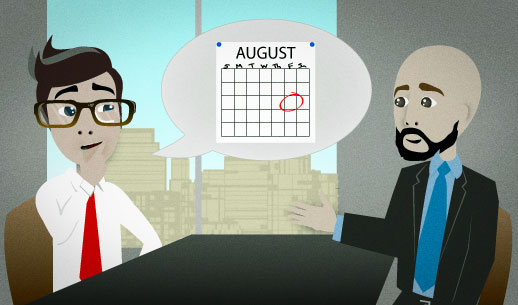
Chores are the bane of my existence. That, and the stuff I have to do for other people or because I feel pressured or obligated by some supreme being. Not necessarily God, but I just feel like I need to do it. For example, I’ve been meaning to paint my kitchen. Why? Not because I want to, or because I think it needs it, but because I feel this obligation to spruce it up, like it’s my duty, somehow. Logically, I know it isn’t, but try reasoning with my gut feeling.
The thing is, when you feel like you are being forced to do something – either for someone else or even for yourself – you won’t have a great time doing it. You might not even do it at all. Instead, you’ll keep putting it off. What do we call that? Say it with me, folks: procrastination.
27. Your project is sensitive
Some work is more emotional than other, and that might be your exact problem. If something hits too close to home and you don’t want to deal with it, of course you’re going to try like hell to avoid facing the issue. Say you have to write about death, or about a break-up. You might have had a recent experience with one of those things and that left you wounded and emotionally vulnerable. You try to forget about it, but then you’re confronted with this task you need to complete, and it’s just too hard.
Pro tip: The best course of action is to detach yourself completely. This is not about you, and it’s something you have to get done, so focus on doing a good job and leave the personal stuff aside.
[optinform]
- You are out of your comfort zone
We live for comfort, right? We like things to be easy, familiar, and comfortable, and anything that leaves that zone automatically makes us feel uneasy. People generally don’t like unfamiliar situations, so anyone will feel a bit anxious or apprehensive when they’re outside their comfort zone. However, what you also have to remember is that without stepping outside your comfort zone, it is impossible for you to evolve or grow. This is just an opportunity for you to test your limits and demonstrate that you can do the job, so take it as a challenge.
- You don’t actually care enough
People don’t like to admit this, but a lot of the time, the problem of procrastination comes down to one thing: they just don’t care that much about the task at hand. They don’t care about the work, they don’t care about what happens if it doesn’t get done, and they don’t care enough to do it. Naturally, it never gets done and sometimes, there are even consequences because of it. It is only because of these consequences that we tend to at least try to get the work done. Otherwise, we’d all just abandon the stuff we don’t want to do.
- You lack self-control
I know you tend to get distracted, but you can’t stop working every time something shiny walks by. Poor impulse control is woefully familiar to me, but you’ve gotta work at it, man. Assume responsibility and understand that you can’t waste time on the internet, watch cartoons, play with the cat, and enjoy a plate of cookies if you really should be working. I guess what I’m trying to say is: control yourself!
- You don’t prioritize
Not all chores or tasks are created equal and you have to learn how to prioritize. Realize what is more important and what is worth putting first. Not all of them are, and you may be making the fatal mistake of wasting time on irrelevant tasks, instead of working on your most important one. Now, this may be on purpose, or it may not be, but it’s something you have to pay attention to from now on.
- You don’t make a schedule

One of the secrets to ending procrastination – one which I will go more in depth on in a following section – is to make a schedule. Without one, the day quickly descends into chaos. I know, because I’ve been there and it’s not pretty. You have to know exactly what you should be doing, when, and for how long. Have a start time and have a projected ending time. Let’s say you assess that this one task will take you three and a half hours – then be sure to schedule something right after, to incentivize yourself to finish on time.
- You don’t hold yourself accountable
But what happens when you don’t manage to finish on time? What happens when you waste the whole day and don’t get anything done? Easy: nothing. Nothing at all. Herein lies the problem – if you don’t hold yourself accountable, how are you going to ever learn, or get motivated to work? When you fail to accomplish your goal, there have to be consequences that you uphold yourself.
TYPES OF PROCRASTINATORS
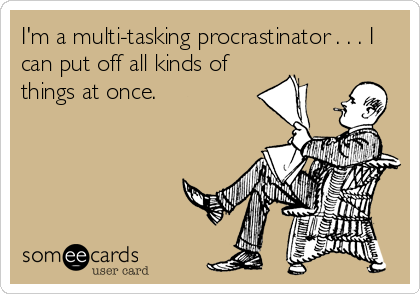
I bet you thought procrastinators are all the same. You can picture them now, I bet – a bunch of unwashed fellows, with uncombed hair and ratty clothes, probably stained. They’re staring into a computer screen, while the papers are piling up around them and the dishes are soaking in the kitchen sink for days. Well, I can neither confirm or deny this image you may have in your head, but what I can do is tell you about the different types of procrastinators.
- The Busy Procrastinator
This one loooves to complain about how busy they are. Either to themselves or to others. They’re always blabbing about how they cannot possibly find the time to complete the work they are procrastinating on, because they are simply too busy. Don’t fall for their reasons, they’re just excuses.
- The Thrill Seeker Procrastinator
Some people need a little excitement in their lives, and in absence of real-life adventures, a tight deadline will just have to do. This kind of procrastinator gets a kick out of the adrenaline rush provided by the limited amount of time they have to get their work done. They leave everything until the last minute, so they can feel cool and important afterwards. It’s not a very good strategy, if you ask me.
- The Worrier Procrastinator
They dislike risk and don’t really enjoy being outside their comfort zone. A project that is difficult, new, or unfamiliar scares them, because they’re treading on new territory and that’s just not something this procrastinator excels at. So, they spend all their time worrying about the outcome and doing none of the work.
- The Dreamer Procrastinator
This procrastinator has good intentions, but gets lost along the way. It’s not that they don’t want to do the work, but they find it much more pleasant to dream about results and achievements and it’s difficult for them to plan out the steps and details of a task and actually follow through with them.
- The List Maker Procrastinator
On the opposite end of the spectrum, we have The List Maker, who is all about planning. An excellent organizer, this type of procrastinator plans out every little thing and step of the process and it makes them feel very accomplished. But while they get the satisfaction of the illusion of productivity, they’re actually just stalling.
- The Indecisive Procrastinator
This procrastinator is often also a Perfectionist, or Perfectionists are also Indecisive. They don’t know where to start, what to do, and what the expected outcome is and they like shifting responsibility onto other people, only not themselves.
- The Over Doer Procrastinator
This one is the definition of biting more than you can chew. This type goes all out and become involved not in one project, but in several ones, all of them complex and demanding. As a consequence, they either don’t get to finish any of them, or they keep putting off one, in favor of completing the others.
- The Perfectionist Procrastinator
Perfect is the enemy of good enough and that’s exactly what’s happening with this kind of procrastinator. The Perfectionist is so afraid of everything not being perfect and of not meeting expectations, that they may not even start working. The fear is paralyzing and it interferes with their work on more than one occasion.
[optinform]
- The Avoider Procrastinator
One thing is certain – whether you succeed or fail at something, people will judge you, and that’s exactly what this procrastinator wishes to avoid. What if they fail? That would be terrible. But what if they succeed, but fail to exceed expectations? That might be worse. Or at least, it is in the head of the Avoider.
10. The Defying Procrastinator
This kind of procrastinator does not feel like carrying out any tasks that they deem unnecessary, unimportant, or unfair. Why would they fall in line with your expectations, when they don’t want to, huh? They won’t finish something they really don’t want to be doing.
- The Manipulative Procrastinator
Things get really complicated when procrastinators start manipulating the success and productivity of others. This can be done by either not turning in necessary work, not showing up to work on some project, etc. If the team can’t do something without the Manipulative Procrastinator, they will make sure they won’t.
- The Stubborn Procrastinator
The Stubborn Procrastinator is a special breed of the Defying one. They won’t do something until they want to or they’re ready, especially if they feel pressured, obligated, forced, etc. No one can make them do it, okay?! So you have to deal with it! Have I mentioned this procrastinator is exhausting?
- The Chronic Procrastinator
Most people might identify with this type, because they are the kings and queens of putting stuff off. The Chronic Procrastinator has a major time management issue and a tendency to grossly underestimate how much time something will take. They are over confident and naïve in their reassurance that they have “plenty of time!” to finish working. Consequently, they’re always finding themselves in a perpetual time crisis, and lacking control over the outcome.
TOP 10 LIES PROCRASTINATORS TELL THEMSELVES
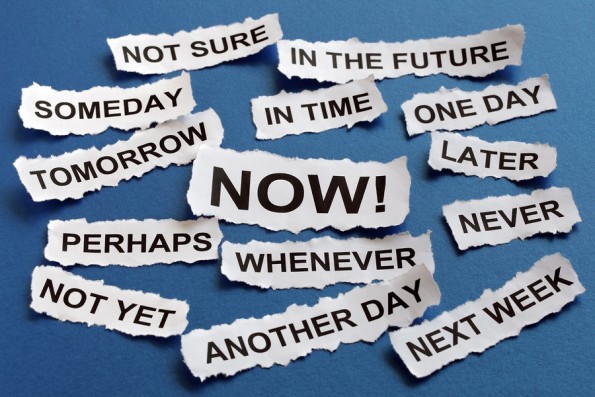
If there’s something we procrastinators do, is lie to ourselves. It’s true – we lie to others, but mostly, we lie to ourselves about why we are not working at this very moment. Make no mistake, there is always some version of an excuse. It’s never that you’re lazy, or that you just don’t feel like it. Your conscience works to find some suitable reason, some excuse that it can offer up so you won’t feel as guilty about doing literally nothing. Of course, all these lies are worthless, and I’m going to prove it.
- “It’s not my fault that I haven’t finished work yet. It was beyond my control.”
You know what? Pardon my French, but I call bullshit on that. Nothing is beyond your control; no matter what happens, there is a solution to be found, unless you’re lying or you just did nothing. No internet? Call your internet provider and solve the problem. The electricity went down? Find a café and go work there. Can’t solve an essential aspect of a problem? Ask for help or do your own research. There is no such thing as circumstances beyond your control; if something happens, you find a way to fix it and you finish your work.
- “I don’t feel like doing it right now, but I’ll do it later, when I’m in the mood!”
Who are you even kidding right now? You KNOW you won’t be in the mood later. If it’s 11 o’clock in the morning and you waste the next three hours, and then take a nap, you really think you’re going to be in the mood at 4 in the afternoon? There is not enough coffee in the world for that, my friend. The time for action is now, not later. Postponing it until “later” is the exact same as saying “I am giving up”.
- “I work best under pressure and I’m much more productive, so I’m just going to leave it all until the last minute.”
Some people do work well under pressure; that’s true. A tight deadline gives you an adrenaline rush, and every little wheel in your brain is spinning at full speed, in order to get the job done. But this approach has several problems:
- It doesn’t leave much room for errors, oversights, and unforeseen issues
- It is never (I repeat, never) your best work
Everything must be done at its own pace and in its own time. If you just leave everything until the last minute, you might not even finish, and even if you do, something unexpected might come up, or you will botch the job. A finished product is not necessarily a quality product.
- “I don’t have any more energy or interest in this, because I’ve worked on it for so long.”
Oh please. You’ve worked a little on something and now you’re giving up, because you’re all tired? What happened to your ambition? What happened to the drive to get stuff done? Working on it for a while is not an excuse to call it in and try again tomorrow.
- “It’s going to be ok, even if I don’t finish this now. What’s the worst that can happen?”
You’re right, the world as we know it will not come to an end, no one is going to lose a foot and no one is dying, but what is up with that line of reasoning? That is not how you look at a situation, in terms of whether or not your failure to complete a task will produce a natural disaster. You need to learn to take responsibility, complete your assignments and face the consequences for your actions. Just because it’s not a life or death situation doesn’t mean it’s not important.
- “This event is important/special/unique, so I can’t miss it for work.”
Nothing is truly a once in a lifetime event, not even marriage. A funeral is one, I’d say, but your college buddy’s bachelor party? Happy hour at some dive bar? A blind date arranged by your friend who swears they found your “soulmate”? Hard pass. Stick to your work and play later. Nothing is that special that it warrants abandoning your work mid-process.
- “I’ll spend less time on the task if I postpone it until the last minute.”
Now, that’s just dumb. Spending less time is not a feature in this case, but a bug. Spending less time on your work is not something to brag about, unless you are some super genius who is able to do it perfectly in a fraction of the time. I’m going to take a wild guess and say you are not. That being said, take the time to properly complete your project, because you will be able to tell exactly how much time you spent on it by looking at the outcome.
[optinform]
- “I’m not sure how to solve this or where to begin, so why don’t I first figure it out and then do it?”
Yeah, you don’t know what to do, so you quit; that’s a great idea! The best, really. Instead of throwing in the towel and lying that you’re gonna start again when you figure it out (yeah, right), spend the time NOW and figure out how to solve this NOW. Think about it like this: if you spend time doing it now, you will eventually figure it out and your work will be done. If you give up, your effort until now will have been in vain, you will spend a hell of a lot more time figuring it out, and your work will be far from done.
- “It turned out fine the other time(s) I waited until the last minute, so everything is going to be great!”
No, no, no, no, no. No. Just because you got lucky once or twice doesn’t mean you can get away with botching your tasks every single time. We all slip up once in a while and we turn in work that was done last minute or wasn’t that great. People will generally let it slide. But to leave all your work until the last minute, because you delude yourself that it will be fine? That’s a no-no.
- “I don’t really want to work on this, so it won’t get done.”
Okay, this one may not be a lie, because I’m sure you genuinely don’t want to do it and don’t have any intention of carrying it out. However, it’s a piss poor excuse, and you may actually still be lying to yourself about your motivations. Why don’t you want to work on it? Perhaps it’s because you’re afraid? Because you’re anxious? Then why don’t you just say so?
HOW TO STOP PROCRASTINATING
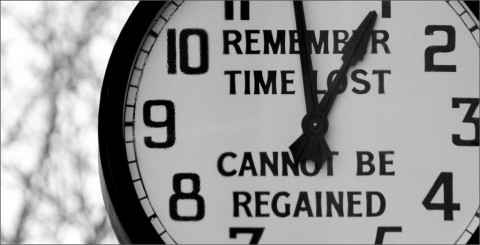
Now, this is what you’ve all been waiting for: is there any solution to our shared problem of procrastination? Are we doomed to spending out whole lives postponing important work, because we’re too busy making excuses for ourselves? You’ll be happy to hear that the answer is no – as in, you are not necessarily sentenced to a life of this. And yes, there are steps you can take to overcome your issue and become a more productive individual.
I became inspired to change my habits after having the chance to read Brian Tracy’s book, “Eat That Frog” – for those of you who are not familiar with it, it’s a book about stopping procrastination and increasing productivity. The book includes 21 different methods you can employ to stop procrastinating, and obviously, I found it quite helpful.
I am now going to present you with a few steps that I have found to be helpful, effective and rewarding. They’ve worked for me, and I hope they will for you. Not everything will apply to your situation or personality, but if at least a few of these tips work for you, I’ll consider that my job was well done. Let us get rid of the shackles of procrastination together!
- Reserve the first half our of your day for work
Let me tell you how I used to start my day a few months ago – I’d get up, stretch, go make coffee, check my social media on my phone, go back to bed, turn on my laptop, hang out on reddit for a while, check email…you know, just for 15 minutes, while I had my coffee. Or so I thought. 100% of the time, it turned into at least an hour and you can guess that it would eat into my work time something fierce. Of course, things have greatly changed, as you can see in this article.
Don’t make the same mistake I made. Instead, after you wash your face (with cold water!) get right into it. I know it’s the last thing in the world you want to do right after you wake up, but trust me on this, it’s going to get your gears going. After 10 to 15 minutes, you’ll have woken up, you will have started work and gotten things done. By the time you remember you haven’t even had coffee yet, you will be well on your way to finishing work, and you won’t feel the need to waste your life away on cat videos.
- Work in short periods of time
More often than not, it’s not just the sheer volume of the work you need to do, but the extended amount of time it’ll take you that scares you and sends you into a panic. Just like you can divide your work in smaller parts, you can also choose to work for short amounts of time. Let’s say you work for half an hour and then you take a quick break to do something you like. Does that sound bearable?
Pro tip: Start out small, with five minutes of work. Then, you can go up to ten or fifteen minutes. Increase the amount of time you spend working as you go along, and remember never to go more than an hour without a break.
- Use positive reinforcement as a motivational tool
It has been proven that positive reinforcement is an excellent motivational tool that leads to higher levels of productivity. Not only that, but think about how we train dogs, for example: if they do the trick, they receive the treat. The same thing works for children, so why not for you, too? Now, I’m not saying you have a simple mind like a dog; what I’m saying is that hey, candy is awesome, and why don’t you reward yourself with a piece after you’ve finished a part of your work?
Of course, you can use any kind of incentive you want. Candy, internet time, phone time, Facebook, TV, coffee, or anything else that makes you happy. You want 10 minutes of Facebook? Then finish your work.
- Use negative reinforcement as a motivational tool
However, positive reinforcement may not be enough for really hardcore procrastinators. Or maybe you’re just not motivated by simple treats. For people like you, other people have come up with effective (and slightly diabolical) methods for negative reinforcement. This may come off as slightly masochistic, but you’ve gotta do what you gotta do.
Some evil geniuses came up with an app where you can put money down in exchange for you finishing a certain task. Let’s say you really need to finish a project by next week, and you cannot afford to procrastinate. You put down 50 bucks, and if you succeed, you get it back. If you don’t – and this is where it gets interesting – you lose the money, and it gets donated to a friend, an enemy, a charity you like, or one that you despise.
This is the ultimate motivational tool; if the prospect of giving money to people you hate won’t motivate you to stop procrastinating, nothing will.
- Do the difficult stuff first
Let me guess – when you were a little kid, you would always try to convince your parents to let you eat dessert before dinner. I know that because I still do it sometimes. Listen, it’s human nature to want the sweet stuff first and receive instant gratification, but after the fun is over, you’re still left with the thing you really don’t want to do. Therefore, I propose a foolproof method: do the hard stuff first! If it was good enough for Dale Carnegie, it’s good enough for you.
I know, it’s revolutionary, but man, I’ll be damned if it doesn’t work. Both parts of the job have to get done, anyway, but if you do the easy part first, the difficult one will just feel twice as long and you will have zero motivation to do it. However, starting with the hard part gives you an incentive to complete it faster, because you know it has to end sometime, and then hey – you get to do something simple! As Carnegie advises us: “The easy jobs will take care of themselves.”
- Get rid of distractions
The bane of the procrastinator’s existence are distractions. Especially for someone with such a short attention span, it becomes a major problem. So the best course of action I can recommend is removing them altogether. This means going the whole hog:
- Turning off your phone
- Blocking your preferred websites
- Using noise-cancelling headphones
- Setting up a Do Not Disturb schedule
It’s not enough to just decide that you won’t allow yourself to be distracted, because I’m going to be honest with you – that doesn’t work. You have to really make an effort and eliminate anything that might take attention away from your work, whether it’s phone calls to your buddies, cuddly pets, or surfing the web.
[optinform]
- Create a schedule
What I found that has helped me tremendously are To Do lists. I can almost see you making a face, and I know they’re kind of geeky, but organization is the answer to most of your problems. All you really have to do is make a schedule for yourself and write down the tasks you need to do for the day. And yes, I mean write, as in with pen and paper, none of that app garbage. What you need is to write it down and lock it into your brain.
There are very few things in life that are as satisfying as checking stuff off a list, so take advantage of that write down every single step. Get started on project? Check! Make a plan? Check! Write introduction? Check! You get the idea. Allot some time for each task, stick to it, and check it off the list as you go. I promise this works.
- Focus on one thing at a time
A complaint I often hear is that people get very overwhelmed, very fast, because their work is too complex. The problem is that they mistakenly try to take on the entire thing at once, and that’s a surefire way to feel like you’re drowning. Instead, what you need to do is take things gradually and focus on one thing at a time. Otherwise, the sheer terror of this massive project will stop you from even starting.
Pro tip: Start small, and with things you understand. After you get a hang of things, you can move on to the big, bad, difficult parts of the project.
- Divide complex projects in smaller increments
This one ties in with the previous tip, but it’s always a good idea to divide your work. No matter what you have to do, start by making a plan and divide it into smaller, shorter pieces. This works, no matter what you have to do, whether it’s writing, programming, cleaning, or other endeavors. The reason behind the success of this method is purely psychological – it’s easier for us to handle many small tasks that have an end in sight than one big task that seems to go on forever.
- Big goals, small goals
Setting goals is the secret to being productive and touching milestones. That’s why you need goals for any kind of work you do. Much like we all have goals in life, long-term and short-term, big and small, I want you to set up goals for your work.
Small goals: figure out what you are going to do, make a plan, create an introduction
Big goals: finish research, write a chapter, complete task
- Focus on the outcome
The journey is long, but oh, wait until you’re finished and you can enjoy the results! I know the process until you get there can be grueling and long, and that is what slows down a lot of people and makes them procrastinate. “I have HOW much to go until I finish?!” is something you may be asking yourself over and over, and more than once, you will be tempted to just throw in the towel.
But all that messiness can be avoided if you just keep your eyes on the prize and think about the outcome of your work. Remember that you are working hard towards something worthwhile and when you finish, you will receive money/have professional satisfaction/win a prize/enjoy the results/receive praise, etc. No matter why you are doing what you are doing, keep in mind that there’s a light at the end of the tunnel.
- Just get started already
By far, the hardest part is to just start working. This is true for any project and any line of work – it’s incredibly difficult to get started, until you do. After that, everything becomes magically easier. It’s going to sound stupid, but the hardest part is definitely the period before you actually start working.
Especially when you have one of those situations when you have no idea what you are supposed to do or where to start, don’t think about it – just start somewhere, anywhere, and things will fall into place before you know it. Once you get into the swing of things, you start making connections and ideas start to flow. Stop worrying about how to start and just start, damn it!
- Get someone to hold you accountable
If you’re having trouble, you can always ask for help from a mate who is willing to hold you accountable. Think of them as your partner and ask them to keep tabs on you and force you to finish your work, if necessary. If your task is suitable for team work, that’s great! If not, at least make sure someone knows what you should be doing and ask them to check up on you, or even give you deadlines.
For example, let’s say you have to turn in a project three days from now. Have your friend set up a system in which you have to regularly update them with your progress on your work.
Pro tip: Look for a friend who knows a little about what you are doing, so they can help judge the thoroughness and quality of your work. If you’re writing an article, have them proofread. If you are working on an app, ask them test it. If you are working on a design for something, they can check it out and give suggestions, etc.
- Create a situation with no escape
What I mean by this is setting it up for yourself so that you have no other choice than finishing your work. Allow me to give you some examples:
- Email or call your boss, teacher, supervisor, friend, etc. and assure them you are going to have the work done by X day, at X time. This way, you create expectations and you commit to honoring them ahead of time.
- Schedule other things to do for the last days before your deadline. This will force you to get your work done NOW, as opposed to later, because you literally can’t do it any other time.
BONUS 1 – A FEW STUDIES ON PROCRASTINATION
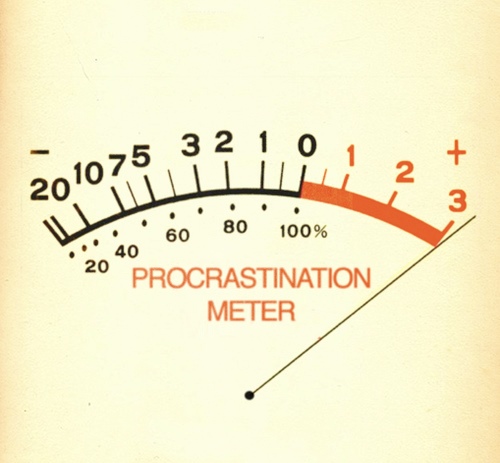
Procrastination is clearly a fascinating subject, otherwise there wouldn’t be so much to talk about in relation to it. But far from being a recent or imagined problem, procrastination has actually been the subject of several studies conducted by psychologists and people looking to find out the explanation and reasons behind this phenomenon.
Several teams have looked into the issue throughout the years, but a couple of them stand out, as does their research. Back when not much was known about procrastination, Roy Baumeister, William James, and Dianne Tice conducted a study at a university in 1997. The results, published in “Psychological Science”, showed some initial positive results, with procrastinating students exhibiting less stress, presumably because they left their work until the last minute, as opposed to doing it consistently.
However, by the end of the study, it has become obvious that procrastination does not, in fact, offer any benefits; only the opposite. Results showed that procrastinating students had actually experienced more stress than their more responsible peers and that their work had suffered tremendously. The conclusions were that their grades were smaller, their work poorer, and their well-being suffered more. This just goes to show that whatever perceived benefits we may think procrastination offers are imaginary.
Based on these conclusions that procrastination does more harm than good, Dianne Tice and Joseph Ferrari conducted their own study, in order to contextualize and explore these drawbacks. Their experiment also involved students, who were invited into a lab and told they were going to be taking a test. They told some of them that the test would be a fun exercise, while others were informed that it would examine their cognitive abilities.
Before the test, they had some time to either play around with Tetris or prepare for the task they would be given. They found that the subjects who procrastinated were the ones who were told they would be taking the cognitive test, but not the ones who expected to just be involved in a fun test.
The conclusions drawn from this experiment were published in “Journal of Research in Personality” in 2000. Ferrari described procrastination as “a maladaptive lifestyle”, where the self-defeating individual is actively undermining and sabotaging one’s self. Ferrari concludes that the chronic procrastinator prefers to be seen as lacking ability, rather than effort.
Timothy Pychyl worked on several studies of procrastination, the first of which was conducted in the 1990s, where he observed the impact emotions and mood have on procrastination. Later, in 2000, the study he published in “Journal of Social Behavior and Personality” confirmed his previous findings.
The study consisted of 45 students, who were each given a pager that they used to send in information about their emotions and level of procrastination, for five days before a deadline. As the time went on and the work became increasingly difficult, the subjects preferred to occupy their time with more enjoyable activities. They did not report an absence of guilt, however – only the opposite.
This fact showed to Pychyl that even though people are relieved to postpone their work in favor of doing something else, there is still an underlying fear and remorse. He was thus able to realize that when people procrastinate, they are well aware of the fact that they are essentially sabotaging themselves and inflicting harm, but don’t have the ability or the strength to ignore or work through the strong desire for a change of activity.
BONUS 2 – PRACTICE

Now that you know pretty much everything there is to know about procrastination, including why you do it and what you can do to stop repeating this behavior, I want to invite you to practice the act of non-procrastination. Yes, you read that correctly – I’m going to give you some exercises you can engage in to help you power through your work and avoid the temptation of distracting yourself.
In order to successfully stop yourself from procrastinating, you first have to understand the psychology behind it; or, better yet, your own psychology. In other words, you have to realize why you’re doing it, what you’re running away from when you delay tasks, how to cope with tasks you don’t want to do, and how to become a more productive worker for your own sake.
- Why do you postpone work?
Okay, first thing’s first – let’s talk about you postponing work. Think of a task you are currently supposed to be working on, but which you are procrastinating on and write it down. Then, I want you to write the reasons why you think you are putting off this work. A simple “I don’t wanna” isn’t going to cut it; dig deep and realize your hidden fears.
After that, you’re going to have to make another column similar to that you just wrote, but that presents rebuttals for the arguments for postponing you have just written. For every single reason you wrote down, I want you to come up with a counter-argument. If you need help with that, you are free to peruse this article again and take a look at the relevant sections. Once you will have your whole list of reason why you should not, in fact, be delaying this task, you will be able to start work without any further distractions.
- What’s the worst that can happen?
One of the types of reasoning procrastinators often use is “What’s the worst that can happen?”, hinting at the fact that it’s not the end of the world if they don’t meet their deadline or if they abandon their project. After all, no one is going to spontaneously combust and burst into flames, so that means it’s all good, right?
Wrong. More often than not, you are not only hurting yourself by procrastinating, but you are also hurting others, by losing their time, money, or failing to meet their expectations. Therefore, what I want you to do is sit down, take a piece of paper, and write a list of all the consequences of you bailing on a project.
For example, you lose money, you’ve wasted your boss’ time, you have disappointed your team, people lose trust in you, they start thinking you are unreliable, not serious, not able to complete a task, you let yourself down, you are not able to be responsible, etc. After being confronted with all the things that can go wrong and will go wrong, you will not think that procrastinating is not a big deal.
- The 2-minute rule
Now, let’s talk about something I believe in strongly, and that is the so-called 2-minute rule. The thought process behind the 2-minute rule is that most things take 2 minutes: either to complete, or at least to start. David Allen introduced this trick in his book “Getting Things Done”, and I have to say that it changed the way I think about chores and small tasks.
His concept is simple: most of the stuff we hate doing, avoid doing, and procrastinate on are short, simple tasks that do not take more than two minutes to complete. Picking your socks off the floor? Two minutes. Putting your clothes back in the dresser, instead of throwing them on the floor? Two minutes. Putting your clothes in the washer, instead of leaving them to pile up in the hamper? Two minutes. Wiping your laptop, making your bed, dusting your workspace, cleaning out the Recycle Bin on your computer? All achievable in two minutes.
This is what I was able to implement in my own life and it changed the way I think and see things. I no longer see this stuff as terrible chores I must avoid at all cost; instead, they’re just a series of two-minute actions I can spare time for.
Then, we have the habits that can be formed in that same 2-minute window. As I said before in this same article, the hardest part is starting to do something. It’s always so difficult to start, but after that, it all becomes magically easier. This is the logic behind this type of 2-minute rule: just start something, because it will always take you less than two minutes. Then, see where that takes you.
- Create a challenge
This is, perhaps, one of the easiest and mindless practice methods, but it is also one of the most effective. Known as the Seinfeld Strategy, this exercise will not work on your aptitudes, results, or motivation, but it will help you stay on track. Let me back up a little and explain. Brad Isaac was a young comedian who had the good fortune to receive advice from wildly successful comedian Jerry Seinfeld.
What Seinfeld taught him, to beat procrastination, was to start writing jokes (of course, you can replace the activity with something relevant to you) every single day and mark that on a calendar. Consistency will show in a chain of big, red marks illustrating your constant effort, without fail. The challenge thus becomes not staying motivated in your work, but not breaking the chain.
I told you it was simple and mindless, but it works! Indeed, when you see how many days you’ve gone without procrastinating, you will feel proud. Not because of what that means, practically, but because you were able to keep doing something every single day, without stopping. You wouldn’t want to break the chain and have a blank day on the calendar. So, don’t skip your work. It literally is as simple as that.
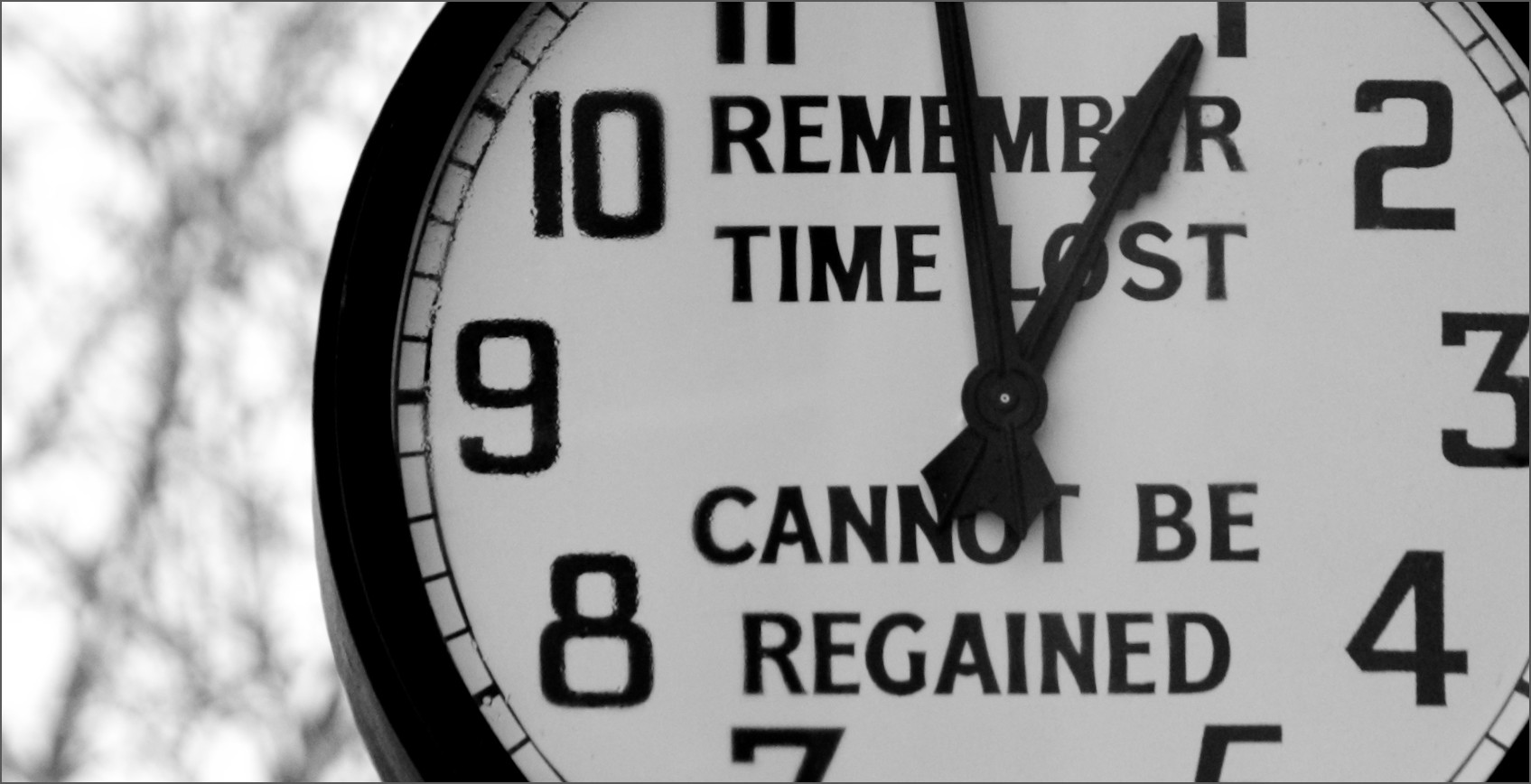
It is indeed all of that I aminterestedto read . It would also serve my purpose. Awesome great thanks
another type:one who reads articles about procrastion, or going down the rabbit hole of the internet